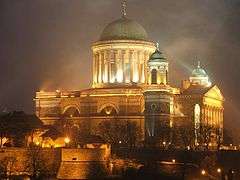József Hild
József Hild (born as Josef Hild, Hungarian: Hild József, 8 December 1789 in Pest – 6 March 1867 in Pest) was a Hungarian -German architect.[1] One of the major exponents of neoclassical architecture of the time, he played an important part in the remodelling of Pest during the so-called reform era (early 19th century).
József Hild | |
|---|---|
 József Hild | |
| Born | Josef Hild 6 April 1814 |
| Died | 6 March 1867 Pest, Habsburg Empire |
| Nationality | Hungarian, German |
| Alma mater | TU Wien, Vienna |
| Occupation | Architect |
| Practice | Charles Moreau Mihály Pollack |
Life and career
Hild gained an early interest in architecture through his father, also a Bohemian architect, and studied at the Vienna Academy while working for the Esterhazy family. There he worked under Charles de Moreau in Kismarton and Vienna.[1] Following his father's death in 1811, he interrupted his studies but applied to become a master builder which was granted pending he gain further experience. This lead him to travelling to Italy, where he completed further studies in Naples, Rome, Florence and Milan. After returning home in the 1820s he slowly built up a reputation which was to culminate in the rebuilding of Pest following the floods of 1838. In 1844 he became a master builder and from 1845 was appointed city architect of Pest.
Works
Hild's classicist style contributed greatly to the transformation of Pest in the early 19th century.[1] In his last decades he began to incorporate a broader historicist style, but his best known works are still strongly neoclassicist, particularly the churches.
- Saint Stephen's Basilica plans (completed by Miklos Ybl)
- Lloyd Palace, Roosevelt Square (subsequently demolished & replaced by the Gresham Palace)
- Apartment buildings e.g. Gross (Jozsef nador squ. 1); Karolyi-Trattner (Petofi Sandor str. 3); Derra and Marczibanyi buildings (Oktober 6 str.)
- Villas in Hűvösvölgy: Csendilla, Hild-villa
- Remodelling of Kalvin Square & Kalvin Church following the floods in 1838, then also in 1854–55
- Basilica, Savings Bank building, Bibliotheca (Library), Seminary
- Parish house
- Reformed Church
References
- Hild József, Hungarian Electronic Library, retrieved 11 May 2012 (in Hungarian)
External links
![]()
